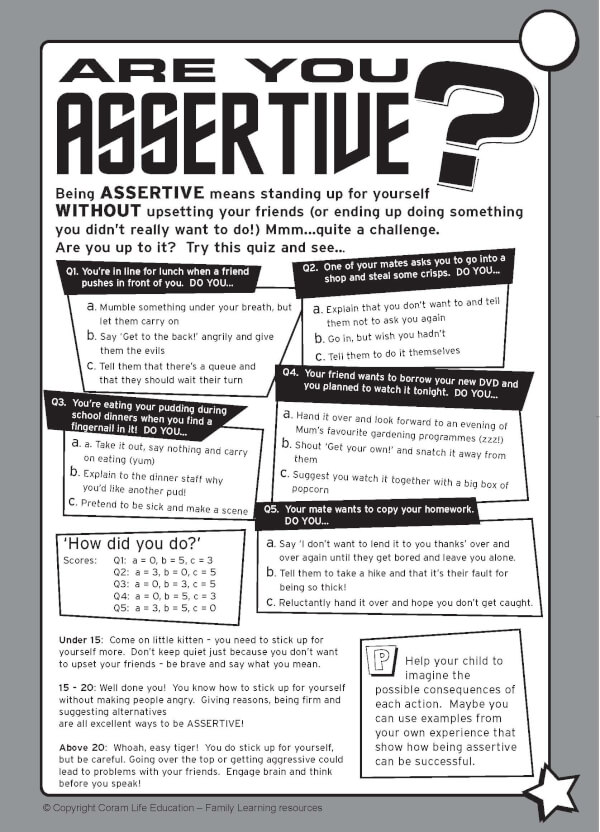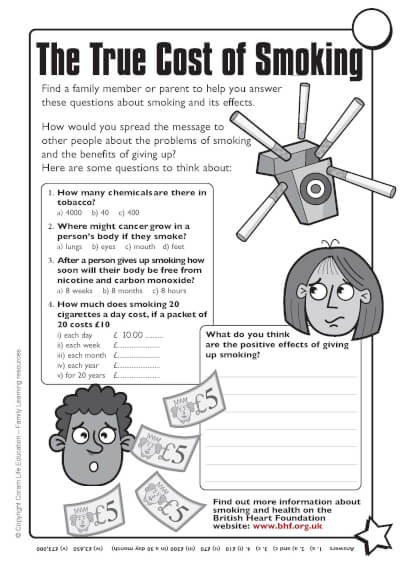SCARF at Home: Keeping Myself Safe - activities for 9-11 year-olds
What your child will be learning about
- Assertiveness skills
- Reasons why someone might choose to give up (or not start) smoking
- The difference between ‘bullying’ and unkind behaviour
- How to spot potentially dangerous behaviour on the internet and how to respond if they do
What your child can think about - or for you to talk about, together
- How can I say what I want in a clear, calm way, without giving in or getting angry?
- What have I heard about smoking and how it affects the body?
- What are some of the other effects of smoking?
- Is someone bullying or just being unkind? How can we tell the difference?
- What are the rules and skills for staying safe online?
What your child can do - together with you, or independently
Activity 1 - Being Assertive
Knowing how to say what you want in a clear and calm way is a really important skill to learn and practise. Have a go at this quiz to find out more about how to be assertive.

See if you can talk to a parent or adult helper about the different situations.
Note to parent or adult helper: try to help your child imagine the possible consequences of each action. Maybe you can use examples from your own experience where being assertive has been successful.
Activity 2 - The True Cost of Smoking
Ask a parent or adult helper to work with you. Open up this activity by click on the picture below. Find out about some of the effects of smoking.

Click on the picture to make it bigger or to print it.
Print this and fill in the answers. If you don't have a printer, just write your answers on a piece of paper.
Always remember to respect other people’s choices, even if you do not agree with them.
ANSWERS: these are at the bottom of the sheet. No peeking before you do the quiz!
Activity 3 - Spot Bullying
Click on the Spot Bullying interactive page, below, to hear and see three examples of different types of unfriendly behaviour.
Talk to a parent or adult helper about what you have seen. Decide if you think it is bullying or not.
It might help to use the ‘STOP’ definition of bullying:
- Several
- Times
- On
- Purpose.
Sometimes, people might use the word ‘bullying’ to describe behaviour that is actually just a one-off or even accidentally unkind. It doesn’t mean that that behaviour is OK but it isn’t bullying.
Parent or adult helper notes to help with the discussions:
Scenario 1 – Emma’s Story
- Identify the unfriendly behaviours in the scenario
- Decide if this is an example of bullying (yes – because it's ongoing, teasing, spreading rumours, talking about someone behind their back, intimidation).
Scenario 2 – Josh’s story
- Compare the unfriendly behaviours between Josh and Emma’s stories. What was different about the behaviours?
- Decide if this is an example of bullying (yes – sending embarrassing photos, making cruel comments and sending them to a wider audience, sending nasty emails, getting others to gang-up on a person).
- How does the use of technology make this different to the other two scenarios?
- What role did Sam play?
Scenario 3 – Yasmin’s story
- Compare the unfriendly behaviours in Yasmin’s scenario with the behaviours in Emma’s story.
- Decide if it is an example of bullying, why/why not? [no – two friends, equal status, one off argument]
Activity 4 - Play, Like, Share
Ask a parent or adult helper to work with you.
Click on the picture below to play the film about staying safe online.
Play Like Share follows the adventures of Alfie, Ellie and Sam as they form a band and enter their school’s Battle of the Bands contest, taking on the mean but ‘cool’ Popcorn Wizards as they go. The three friends learn that while the internet can help, they need to use it wisely and safely.
The aim of the films is to help 8-11 year-olds learn how to stay safe online. In particular, the films teach them to spot the early signs of manipulative, pressurising and threatening behaviour by people they might meet online, and develops their confidence to respond safely and get help.
Note about ThinkUKnow and CEOP for parents and carers
Learn more about how to help your child stay safe online at the ThinkUKnow website, here.
ThinkUKnow is produced by National Crime Agency's Child Exploitation and Online Protection unit - CEOP and contains lots of useful advice, guidance and resources.

